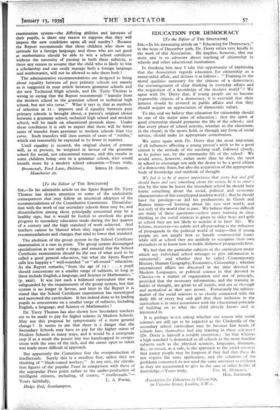[To the Editor of THE SPECTATOR]
Snt,—In his admirable article on the Spens Report Dr. Terry Thomas has drawn attention to some of the undesirable consequences that may follow an uncritical adoption of the recommendations of the Consultative Committee. Dissatisfac- tion with the work of our secondary schools there may be, and dissatisfaction among those principally concerned may be a healthy sign, but it would be foolish to overlook the great progress in secondary education made during the last quarter of a century and the high standard of work achieved. And teachers cannot be blamed when they regard with suspicion recommendations and changes that tend to lower that standard.
The abolition of the group system in the School Certificate examination is a case in point. The group system discouraged specialisation at too early a stage, and ensured that the School Certificate examination should be the test of what used to be called a good general education, but what the Spens Report calls less happily a " well-rounded " or " all-round " education. As the Report remarks, "from the age of 13+ . . . a pupil should concentrate on a smaller range of subjects, so long as these include English, a language, and Science or Mathematics." (p. xxiii) It was just such a balanced curriculum that was safeguarded by the requirements of the group system, but that system is no longer in favour, and later in the Report it is stated that the School Certificate examination has stereotyped and narrowed the curriculum. It has indeed done so by leading pupils to concentrate on a smaller range of subjects, including English, a language, and Science or Mathematics !
Dr. Terry Thomas has also shown how Secondary teachers are to be made to pay for higher salaries in Modem Schools. May not this proposal be symptomatic of a more general change ? It seems to me that there is a danger that the Secondary Schools may have to pay for the higher status of Modern Schools in many ways, and it would be a retrograde step if as a result the poorer boy was handicapped in compe- tition with the sons of the rich, and the career open to talent was made more difficult of approach.
But apparently the Committee fear the overproduction of intellectuals. Surely this is a needless fear, unless they are thinking of " black-coated workers." At any rate, the circula- tion figures of the popular Press in comparison with those of the unpopular Press point rather to the under-production of intelligent citizens, including, of course, " intellectuals."—
Hedge End, Southampton.






































 Previous page
Previous page